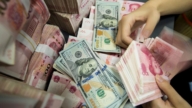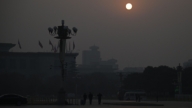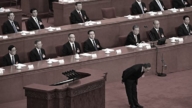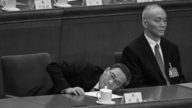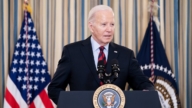【新唐人2013年01月12日訊】新年伊始,中國最火紅的,莫過於《南方週末》新年特刊,遭中共廣東省委宣傳部官員竄改一事。在中共廣東省委書記胡春華介入之後,事件出現了轉圜,目前看來,風波似乎暫時告一段落。然而,英國《金融時報》卻認為﹕在中華人民共和國的憲法第35條中,明確規定要保護言論自由和新聞自由,這和《南方週末》事件兩者之間的矛盾,看上去荒謬和可笑。
憲法第35條規定,「中華人民共和國公民有言論、出版、結社、遊行、示威的自由。」然而,中共當局始終沒有落實憲法35條規定,甚至,連言論自由這個片語都被屏蔽。
《金融時報》10號刊登一篇文章,標題是「從《南方週末》事件看中國荒謬的新聞審查現狀」。文章說,儘管中國共產黨在憲法中保留了這一條,但一直用審查制度提醒人們,「黨管媒體是不可動搖的基本原則」,這聽上去的確有點荒謬。
文章引述馬克思的話說,資本主義社會將會因其矛盾的重壓而最終崩潰,所以讓我們共同希望﹕中國的審查制度也會因為它的荒謬重壓而崩潰。
《南方週末》事件在中共廣東省委書記胡春華介入之後,雙方達成共識,10號正常出報,取消事前審查制度,但總編輯黃燦下臺。
有媒體報導,中共新政還是維穩至上,要維穩,就沒有言論自由這回事。《南方週末》只是媒體人微弱的反抗,得到民間支持也很有限,當局擔心事態擴大,急於安撫,如此而已。
資深媒體人高瑜表示,這是這20多年來,第一次,中國這樣的主流媒體如此大規模的罷工。現在從表面上看是中共當局讓步,但未來報社的言論自我審查,是由派進來的新任領導審稿、刪稿、改稿,換句話說,只是換湯不換藥的作法罷了。
資深媒體人高瑜:「媒體是公器,現在中國還沒有私人投資的,基本上都是國家投資,做為公器,他完全是拿納稅人的錢來『違反憲法』,實際上受損害的還是納稅人。」
時事評論員汪北稷表示,《南方週末》的勝利還言之過早,中共絕對不會在這次的事件之後,放鬆對人民的思想管制。
時事評論員汪北稷:「從中共從對整個國家的思想文化、媒體、通訊、微博網絡,整個的管制來看,中共是越來越緊的趨勢,因為中共所代表的利益集團,對這個國家、對社會、對自然環境的壓榨、剝削,已經達到一種惡性循環的地步了。」
汪北稷認為,中共積壓的問題越來越多,如果不嚴控傳媒,那麼官員們為非作歹的惡行被媒體揭露出來,政府就無法再欺騙民眾,那人民就會起來反抗。
汪北稷:「從根本上講的話,如果他(中共)要放鬆思想文化的話,他等於自取滅亡了,如果大家都有自由的發言機會,那大家只有一件事情,就是聲討中共,絕對是把這些年中共所有的罪行全部寫出來,中共就滅亡了,所以中共從這件事情上來講,是絕對不會放鬆媒體新聞思想輿論界的管控,只是會越來越緊。」
《金融時報》的文章最後還說,中共當局最擔心的是社會的不穩定,在太多的官員看來,新聞自由等同於「動亂」,他們擔心輿論自由可能導致另一次「天安門事件」。
不過,也有評論指出,除非中共做好放棄一黨獨裁的準備,否則言論自由一旦釋出,民怨會像排山倒海般的湧出。旅居美國的中國經濟社會學者何清漣撰文指出,「南周事件」是無組織力量與高度組織化政治集團的「軟對抗」,它所遭遇的一切,今後會無數次在中國的社會抗爭中出現。
採訪/易如 編輯/黃億美 後製/郭敬
The Constitution’s Article 35 and Censorship
At the beginning of this year, the hottest topic was
the New Year’s special edition of the Southern Weekly,
which was tampered with by a Guangdong Propaganda
Department official.
After the intervention with the Guangdong Provincial Party
Secretary, Hu Chunhua, the incident has temporarily come to an end.
However, the British Financial Times said, “Article 35
of China’s Constitution is to protect the freedom of expression and freedom of the press.
Thus, conflicts from the Southern Weekly incident look
ridiculous and laughable.
Article 35 of the Constitution stipulates, “Citizens
of the People’s Republic of China enjoy freedom of speech,
press, association, procession and demonstration."
However, the Chinese Communist Party (CCP) never
implemented article 35,and even the phrase, “freedom of speech" is shielded.
The Financial Times published an article in January
entitled, “From the Southern Weekly incident China’s ridiculous censorship can be seen."
The article says the CCP keeps article 35 in the Constitution,
but it uses censorship to remind the public that the Party media is unshakable.
This sounds indeed ridiculous.
The article also quoted Marx as saying capitalist society
will eventually collapse due to the weight of its contradictions.
Let’s hope the censorship in China will collapse
due to the weight of its contradictions.
The CCP Guangdong Provincial Party Secretary, Hu
Chunhua, reached an agreement with the Southern Weekly.
The newspaper will resume normal publication.
The censorship system before publication will be abolished.
The chief editor, Huang Can, will step down.
Some media outlets reported that the CCP focuses
on stability first.
In order to maintain stability, freedom of speech has to go.
The Southern Weekly’s protest was only the weak resistance
of media personnel, accompanied by limited civil support.
Authorities worried about the worsening of the situation,
so they were eager to appease. And that’s all.
Gao Yu, a senior media person, commented that this
is the first time in 20 years that the mainstream media in China encountered such a large-scale strike.
On the surface the CCP made concessions, but the future
self-censorship of the news agencies is up to the new leadership from outside.
That includes the review, deletion and revision of articles.
In other words, it is the same old wine, but in a new bottle.
Changes are only superficial.
Gao Yu: “Media is a public institution.
However, right now no one makes any investment in it
and it is basically a public funded instrument.
The CCP uses taxpayers’ money to violate the Constitution.
In actuality, victims are only taxpayers."
Wang Beiji, a political commentator, said that
it was too early to mention Southern weekly’s victory,
because the CCP would never give up the control of
people’s thoughts after this incident.
Wang Beiji: “From the control of communist ideology
and culture of the country as a whole, the media,
communication, and microblog network,
one can see that it is getting worse.
The CCP represents interested groups, and its exploitation
of this country, society, and natural environment has reached a vicious cycle.”
Wang Beiji believes that the CCP has accumulated
too many problems.
If it does not control the media, all sorts of evil committed
by officials will be exposed.
Thus, the government will not be able to deceive the people,
and the people will revolt.
Wang Beiji: “Fundamentally, if the CCP relaxes
its ideology and culture, it is committing suicide.
If everyone has an opportunity to speak and do just one thing,
denounce the CCP, it will collapse.
Therefore, the CCP will never let go of its control
of the media and public opinion. It will only tighten control more.”
The Financial Times concluded that the CCP fears
instability of the society the most.
Too many officials think freedom of the press
being equivalent to turmoil.
They worry that freedom of opinion could lead to
another Tiananmen Incident.
However, others commented that unless the CCP has made
preparations to give up the one-party dictatorship,
once freedom of speech is implemented, the grievances
will become a tidal wave.
He Qinglian, a China’s economic and sociology scholar
in the US, pointed out that the Southern Weekly incident
is a soft confrontation between a non-organized group
and a highly organized political group.
There will be numerous social protests like
that in the future.



